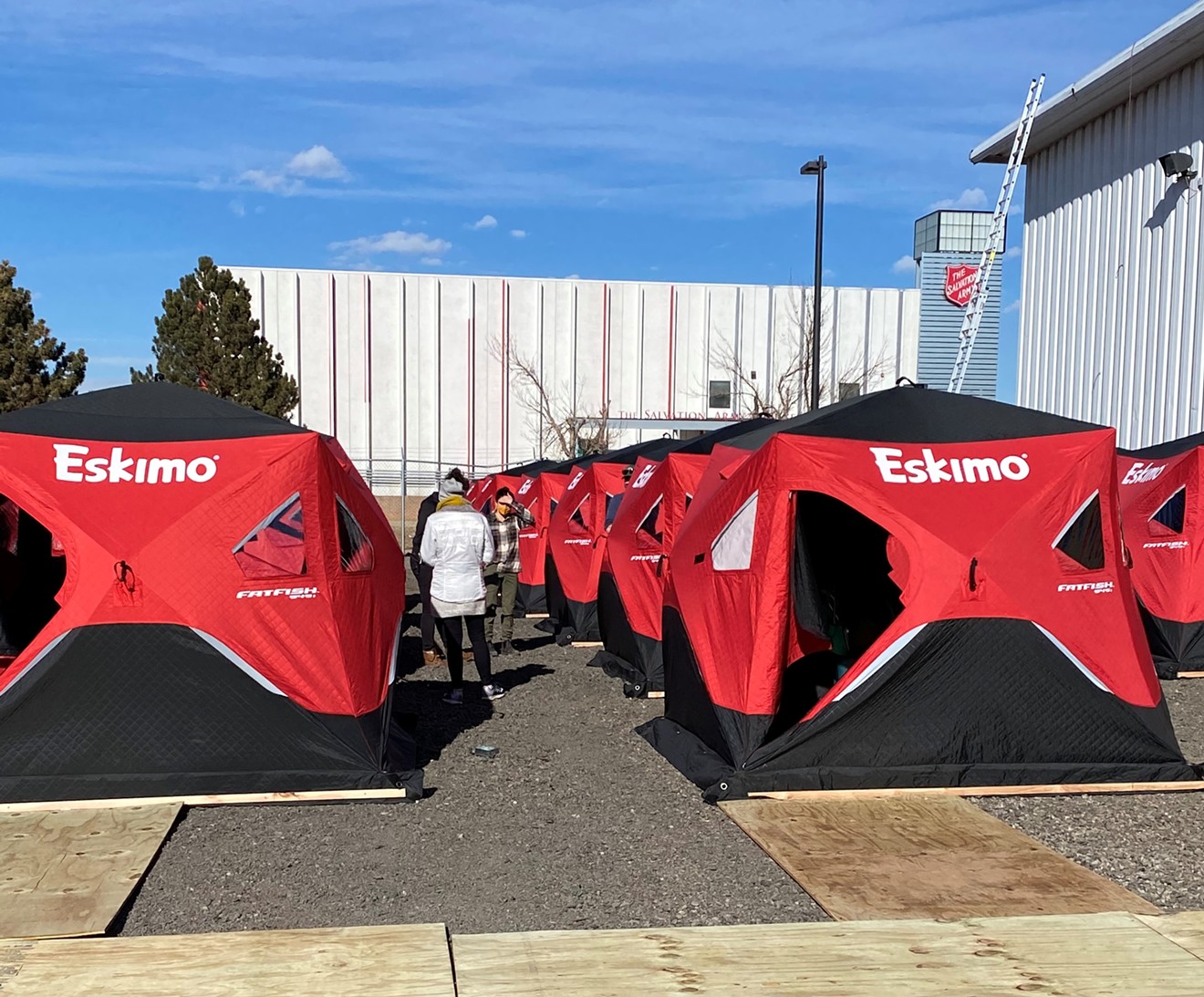With an emergency winter shelter set to wrap up operations in April, the City of Aurora is looking at establishing new safe-camping and -parking sites for people experiencing homelessness — fast.
"It’s about creating options, and that’s what we’re focused on," says Jessica Prosser, Aurora's director of Housing and Community Services. "Building a brand-new shelter has a long lead time and is very expensive, and these safe outdoor spaces create an option that’s a little more nimble in the future to keep people safe and healthy."
As the COVID pandemic lingers and some homeless people either can't or choose not to use shelters, safe- camping and -parking sites are becoming more common throughout Colorado. Denver has had two safe-camping sites since December and a third is on the way. Aurora already has one, too: In January, the city set up a safe-camping site right next to the 100-bed emergency shelter that was established last fall in an industrial area in the northwest part of the city.
Aurora's safe-camping site features about thirty ice-fishing tents with heaters and raised pallets; about a dozen nearby parking spaces are reserved for people who are living in their vehicles. But right now, the tents are used as COVID isolation areas. "At the emergency shelter, we were really hoping to have safe camping available to anyone who was interested, but it ended up having to be changed as a result of COVID outbreaks," says Councilmember Alison Coombs.
On February 17, Aurora issued a request for proposals, noting that up to $450,000 in emergency federal grant money is available for service providers willing to establish safe-camping or parking sites on privately owned land. The grant money will cover the up-front costs for tents and infrastructure at these sites, which typically include durable tents with heaters, portable toilets and hand-washing stations; the city wants nonprofits to cover ongoing operational expenses, such as case-management services. The deadline for proposals was February 24; the city is moving quickly, because the emergency shelter will close in two months. Officials hope to have at least one new site set up by May.
The location is still undetermined, but "access to transportation" is important, says Lana Dalton, Aurora's homelessness programs manager.
She also thinks that establishing the sites in different parts of Aurora could help educate the "not in my backyard" crowd. "It gives the community kind of a flavor of what it could be like to have something more permanent or semi-permanent in their neighborhoods," Dalton says.
Coombs agrees. "It creates an opportunity to address a lot of the concerns and complaints people have around trash, public nudity, bathing and public urination," she notes, "because there will actually be facilities for people to use privately."
Prosser and Dalton estimate that between 300 and 400 people are homeless in Aurora; the city currently has capacity for 300 individuals at shelters and the existing safe-parking and -camping sites. But capacity will drop to around 150 when the emergency facilities close. Since the timeline is so tight, Aurora directed its request for proposals to organizations with which the city has already contracted. The Salvation Army, for example, is "in discussion with a partner organization on a joint effort," according to Kristen Baluyot of the Salvation Army.
Although Aurora didn't ask for proposals from the Colorado Village Collaborative, the Interfaith Alliance of Colorado or Earthlinks, the three nonprofits running Denver's two existing safe-camping sites, Prosser and Dalton have visited both locations. "We took a lot of the suggestions and connections that they made there," Dalton says.
But Aurora has some ideas of its own, including setting up the temporary sites in places that could be transformed into more permanent shelters later. "Ultimately, the idea is that the folks that are within these safe outdoor spaces can get housed," Prosser says, suggesting that the sites could one day hold tiny homes or some other form of housing.
Although Aurora City Council members disagree on how to deal with homelessness, Coombs believes that the council will approve contracts to set up safe-camping sites. "Some of my colleagues are concerned about both funding that goes to supporting unhoused people in our community as well as anything that they believe would 'discourage people from getting their lives together,'" she notes.
Unlike Denver, Aurora doesn't have a camping ban, but city officials still clear unofficial encampments that pose "a significant criminal or public health threat to the community or a safety threat within the encampment and surrounding area," according to the Aurora website.
[
{
"name": "Air - MediumRectangle - Inline Content - Mobile Display Size",
"component": "12017618",
"insertPoint": "2",
"requiredCountToDisplay": "2"
},{
"name": "Editor Picks",
"component": "17242653",
"insertPoint": "4",
"requiredCountToDisplay": "1"
},{
"name": "Inline Links",
"component": "18838239",
"insertPoint": "8th",
"startingPoint": 8,
"requiredCountToDisplay": "7",
"maxInsertions": 25
},{
"name": "Air - MediumRectangle - Combo - Inline Content",
"component": "17261320",
"insertPoint": "8th",
"startingPoint": 8,
"requiredCountToDisplay": "7",
"maxInsertions": 25
},{
"name": "Inline Links",
"component": "18838239",
"insertPoint": "8th",
"startingPoint": 12,
"requiredCountToDisplay": "11",
"maxInsertions": 25
},{
"name": "Air - Leaderboard Tower - Combo - Inline Content",
"component": "17261321",
"insertPoint": "8th",
"startingPoint": 12,
"requiredCountToDisplay": "11",
"maxInsertions": 25
}
]












